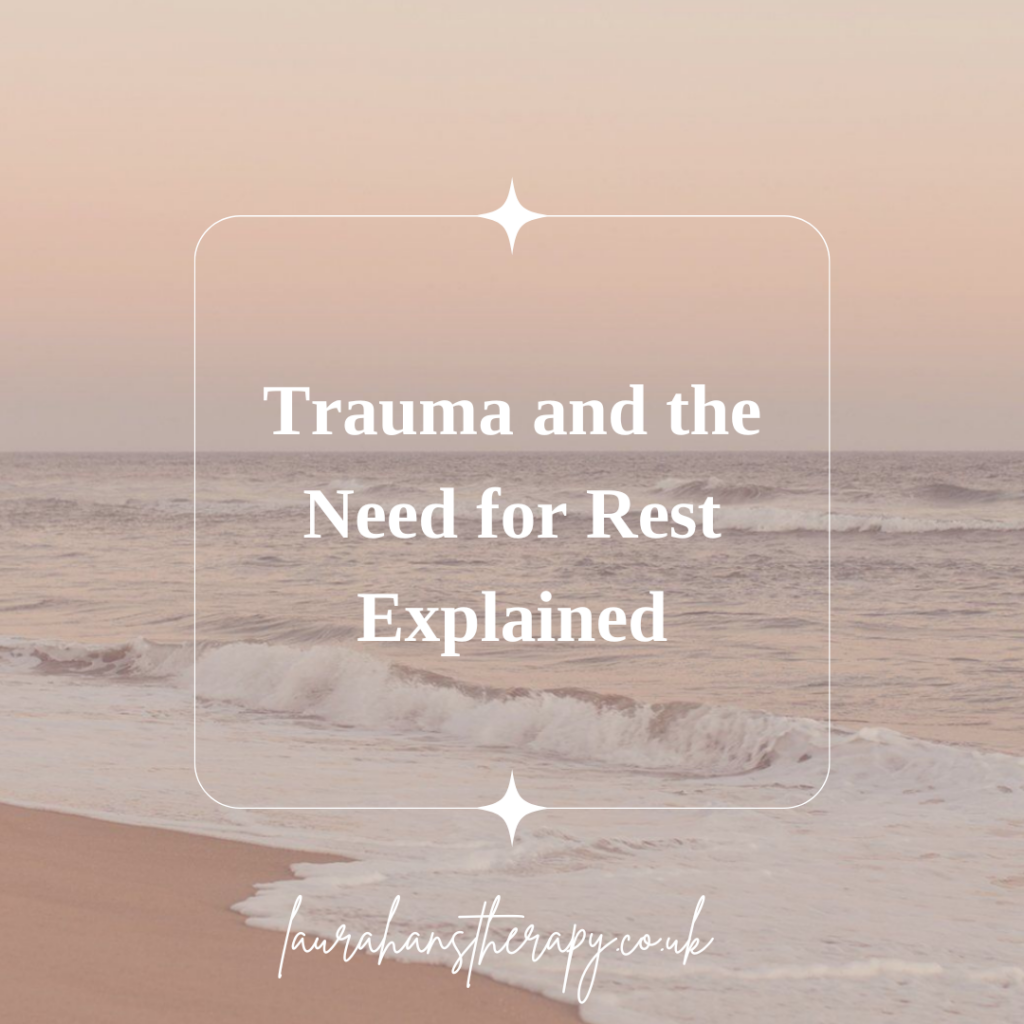Why Is Rest Important?
Rest gives our bodies time to recover. It supports us physically, aiding muscle repair, reducing inflammation, and strengthening the immune system. Rest also helps us lower blood pressure, reduce stress and improve our overall mood.
Rest has never been more vital, especially for mothers. We live incredibly fast paced, busy lives. We’re also exposed to more information than ever before. Mothers face extra pressure. They’re often up in the night with their little ones. Then, regardless of how little sleep they’ve had, they may be working as well. Even if they’re not, being a stay-at-home mum is a full-time job in its own right.
It’s easy to see why our brains and bodies need time to pause and recover! If we don’t get enough rest, we can become physically unwell, but we can also experience stress related symptoms, anxiety, and low mood.
Trauma and the Need for Rest
If you’ve experienced lots of trauma in your life, you will probably need more rest than those who haven’t. You may find you are easily overwhelmed by life. The more things you’ve been through, the harder it can be to function. This creates a greater need for rest because you’re expending more mental and physical energy to cope with the demands of day-to-day life. Trauma can also disrupt your sleep and affect your appetite, both of which can impact your energy levels.
3 Reasons You Might Find It Difficult to Rest
People who have experienced trauma may find it difficult to rest. There are many possible reasons for this, but here are three to get us started…
- Rest Was Never Part of Your Childhood
If you experienced serious neglect or abuse as a child, you were probably too busy trying to survive to even think about rest. But rest can be tricky when your childhood trauma is less obvious too. It might be that when you were younger, you were punished for resting. For example, if you were caught ‘doing nothing’, you may have been made to work around the house or study harder.
If your household valued working and doing rather than resting and being, this will have shaped your own views on rest. For example, if you learned to associate rest with being lazy or ungrateful, it will probably make you feel uncomfortable as an adult. On top of this, you may not have had rest modelled to you either.
- You Have a Noisy Inner Critic
You might find you struggle to rest because you have a strong, harsh inner critic that shames you for resting and tells you how useless and lazy you are for doing so. Alternatively, you might have a demanding inner critic that says you need to be doing more and working harder. These sorts of messages can prevent you from prioritising rest because you struggle to believe you deserve it.
If you’re managing to rest but spend the whole time beating yourself up for doing so, you’re unlikely to experience the benefits. Even though your body is still, your mind is very busy. Read Understanding Your Critical Voice to learn more.
- You’ve Developed Unhelpful Coping Strategies
As children, we develop ways of coping with difficult feelings that are not validated, labelled and processed with the help of our caregivers. These coping modes or strategies can be something you learn through what is modelled to you, but they can also be completely automatic. We don’t consciously decide to avoid a difficult feeling, it’s just something we automatically do. When we experience a sense of relief as a result, the coping mode is positively reinforced, meaning we are more likely to continue using it.
These coping modes were how you survived in childhood. However, in adulthood, they can prevent you from getting your needs met, keeping you stuck in dysfunctional patterns of thinking, feeling, and behaving. For example, in your early life, focusing on working hard and achieving all the time may have prevented you from feeling like a failure. Perhaps it also protected you from harsh judgment or criticism. In this sense, constantly striving and working hard with little or no rest was a successful coping strategy. But in your adult life, it isn’t going to work consistently because nobody can survive without rest. Eventually, this coping mode will fail and have a negative impact on your wellbeing. Read Unhelpful Coping Strategies Explained for more information.
What to Do If You’re Struggling to Rest
If you’re struggling to rest, try writing down a list of non-judgmental statements you can read to yourself that are based on gentle, wise good advice that promotes kindness and compassion rather than pressure and criticism.
Here are some examples:
- I deserve rest
- I am not lazy for needing rest
- It’s not my fault I need more rest than the average person. I have been through so much.
- I have been busy for so long, of course rest feels difficult, but it is a legitimate need.
- If I don’t have this rest, it could lead to burn out or make me physically unwell.
- If I don’t rest, my body might force physical or mental illness upon me.
Next time you notice any discomfort about resting or find yourself listening to your inner critic, read through these statements and focus on being kinder to yourself.
Find Out More
Do you recognise any of the barriers to rest described above? If you need help overcoming them and you’re interested in working with me, you can book a free consultation here. I also share lots of tips and advice via Instagram.
Useful Links
What It Means to Be a Generational Cycle Breaker
